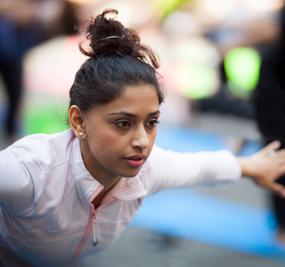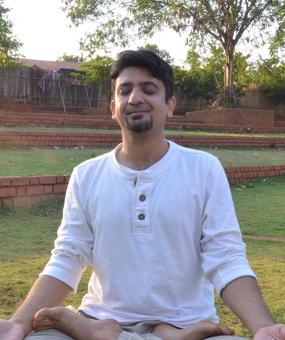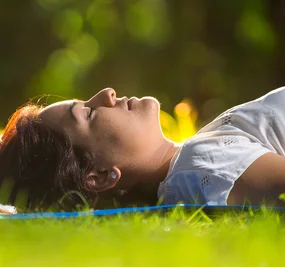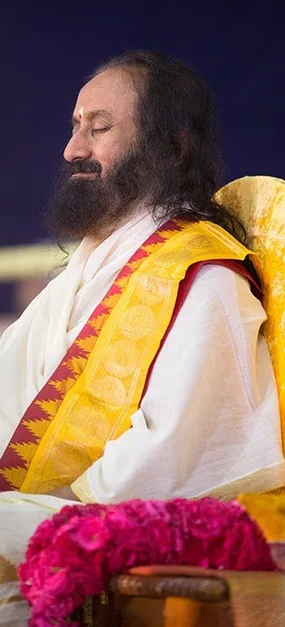Simone Biles has been best known for her gravity-defying flips and the ‘twisties’ – on the floor, balancing beam, and bars, feats for which she has won Olympic gold – 4 times. However, during the Tokyo Olympics, her contribution to mental health and the Olympics has been even more noteworthy. As it has put the spotlight on the elephant in the sports arena – the high stakes and crushing pressure of competing at the highest levels, and its cumulative effect on athletes’ mental health. This can only mean that there is scope for healthy solutions to emerge that will safeguard the mental health of our beloved sportspersons, who are, after all, human.
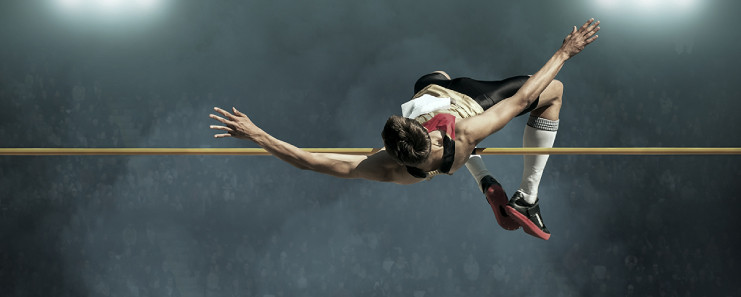
In a recent interaction with top sportspersons, Gurudev Sri Sri Ravi Shankar addressed various mental battles that athletes face, clarifying, inspiring, motivating, and encouraging young, tenacious athletes worldwide. One fundamental question was: Sports and spirituality: An oxymoron?
“When you exercise in the gym, you need to relax all your muscles (to be able to exercise) – if you do not, muscular growth will not happen and your nerves will become tense. The body needs exercise but the mind requires relaxation. Both the body and mind need a combination of workouts and relaxation. So, sports and spirituality are very much complementary.”
Let’s see if we can apply this sensible advice to other aspects of mental struggles players and athletes wrestle with.
How to deal with failure
It is an inevitable part of any sport. Failure is a great teacher but how can sportspersons cope with failure?
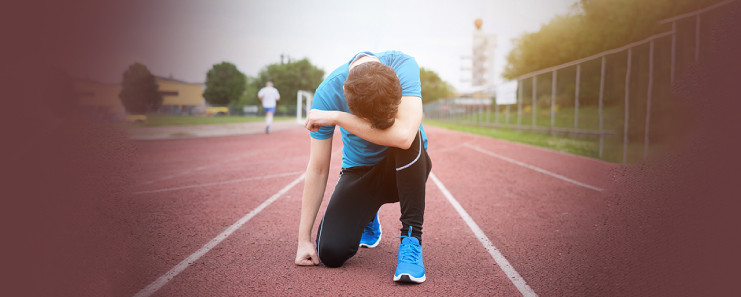
“Sports is about winning and losing. Sometimes, we are ahead and sometimes behind. Either way, just maintain your calm. Remember that when you win, someone else loses. And no one likes to lose. These are life’s challenges. Life is not always the same. Ups and downs are common. We need to accept losses as part of life and move ahead. Stay steadfast. Don’t be disappointed.”
Closed doors of the pandemic
Lockdown guidelines have been extremely restricting and demotivating for athletes whose livelihood depends on practice. What can they do?
“We need to be steadfast a little longer till we have control over the situation. Use this time to increase other skills. Whatever you didn’t have time to do, focus on that. It is a temporary phase. When we open up, practice with renewed vigour.”

How to overcome doubts & achieve your potential
Competitions bring out the best and the worst in players. How do you get over doubts that arise at crucial points of your game and achieve your potential?
“Drop the stress. Have a broader vision. Enlarge your goals & challenges. Have faith in the Divine.”
“While sportspersons train their bodies, training the mind is also important. Effectiveness in sports has a lot to do with how one can keep their focus. I encourage all sportspersons to participate in the Art of Living program as I think it will be very fruitful in training the mind to play sports.”
– Sandeep Singh, the sports minister of Haryana, the former captain of the Indian hockey team, and a world record holder in hockey
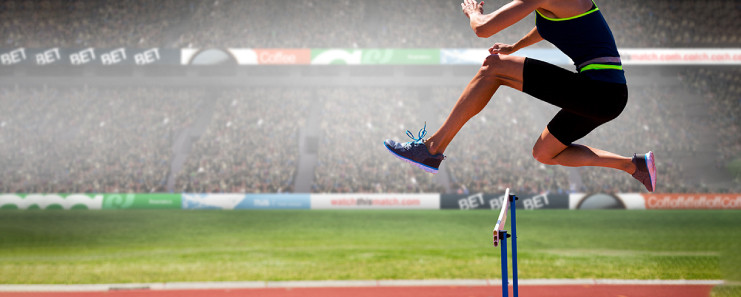
Gurudev on the mental health of athletes
Mental health is absolutely important. If you are not happy, if you are not cheerful doing whatever you are doing, what’s the point? Games are something that come out of a very happy spirit and if athletes are not happy, it shows that they need to do something. Many Olympic athletes are doing Sudarshan Kriya to keep their mental health robust. You need stamina, not just physical stamina but mental vibrancy as well, and meditation and yoga will give you that.
Yoga benefits all your internal systems and helps maintain mental balance. All sports require focus and presence of mind. To become single-minded, meditation and yoga should go hand-in-hand. Before your practice, practice the Sudarshan Kriya and sit for 10 minutes in a guided meditation.

“I did the Online Meditation & Breath Workshop recently. We practised breathing techniques, Sudarshan Kriya, and so on. But, what struck me most was the positivity of the people who were doing the workshop with me. It gave me such a nice feeling even though it was on a Zoom call. The positivity was so infectious. Thank you for creating this platform and helping us share this infectious practice.”
– Saurav Ghosal, squash player, Arjuna awardee
Getting past injuries
Injuries are a part and parcel of every sportsperson’s life. Almost all professional athletes would have dealt with downtime associated with injuries. While the physical effect is debilitating enough, mental anxiety is also a dampener. But some people manage to cross these hurdles and come out on top. Read this inspiring account of one of the worst experiences a player can go through:
“I come from a family of sportspersons. I was hit by a bullet, which paralyzed me; I was in a wheelchair for 2 years. Doctors said that I could not play again. I still managed to play again, joined the team, became a captain, and an Arjuna awardee. I would say, we should have a big goal in life – and when you achieve it, you should set an even higher goal. Don’t celebrate by getting into drugs. Lots of sportsmen celebrate this way and go the wrong way.
– Sandeep Singh
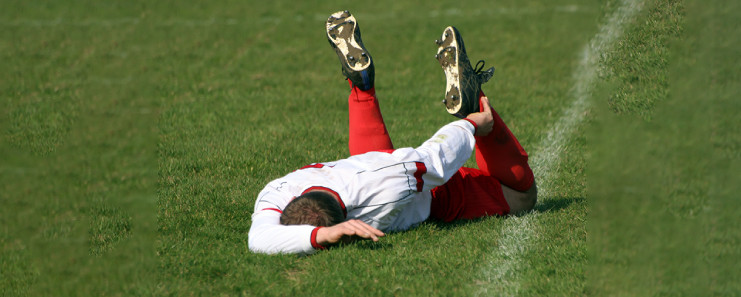
Dealing with the dark side of sports
The youth are high on energy especially those in sports. They get attracted to addictive substances. How can they sidestep these dangerous pitfalls?

“Offer youth something more attractive than drugs. Sudarshan Kriya is so addictive. Lakhs of people have come out of addiction from drugs and alcohol. When they practiced pranayamas and Sudarshan Kriya, they dropped these habits. Sportspersons should do yoga, pranayama, and Sudarshan Kriya. Wage a war against drugs.”
Dealing with thoughts
Just when you need some calm and peace within, your mind chatters ten to a dozen with distracting, demotivating, and depressing thoughts. How can you stop this mental chatter and just focus?
“When you dance or jog, do you have thoughts in your head? No, right? Similarly, when you practice pranayamas like Bhastrika, you are just in the moment. (When you have thoughts), just write down all the thoughts in your mind – and you will see that only the important thoughts will remain. When we do Sudarshan Kriya also, you might have disconnected thoughts. It’s okay. It is a form of cleansing.”
So, just let your thoughts enter and exit your mind. Breathe in, breathe out. The Sudarshan Kriya way!
“I felt really, really good doing the Sudarshan Kriya. I felt like it was a new source of inspiration. I will definitely encourage others to do it.”
– Sanjeev Rajput, shooter, Arjuna awardee
Is it okay to be ruthless in sports?
How can you be compassionate when you are competing? Won’t you lose? And if you are aggressive, won’t it go against the principles of spirituality?
“When you play, you should give your 100 per cent – be ruthless. When you are out of the game, go to the other end – be sensitive and compassionate. One who runs should have the ability to stand still.”
Contrary to popular perception, compassion and sensitivity bring out higher Olympic values and help athletes aim towards the Olympic motto – Citius, Altius, Fortius – Faster, higher, stronger! So, improve your performance in sports with Sudarshan Kriya, the breathing technique that has helped many of the world’s finest Olympic athletes. Join the Art of Living Happiness Program now.
(Based on Gurudev Sri Sri Ravi Shankar’s interaction with various sportspeople)









